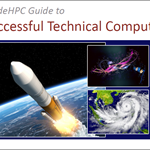Today’s High Performance Computing (HPC) systems offer the ability to model everything from proteins to galaxies. The insights and discoveries offered by these systems are nothing short of astounding. Indeed, the ability to process, move, and store data at unprecedented levels, often reducing jobs from weeks to hours, continues to move science and technology forward at an accelerating pace. This article series offers those considering HPC, both users and managers, guidance when considering the best way to deploy an HPC solution.
Three Questions to Ensure Your HPC Success
Successful HPC computing depends on choosing the architecture that addresses both application and institutional needs. In particular, finding a simple path to leading edge HPC and Data Analytics is not difficult, if you consider the capabilities and limitations of various approaches to HPC performance, scaling, ease of use, and time to solution. Careful analysis and consideration of the following questions will help lead to a successful and cost-effective HPC solution. Here are three questions to ask to ensure HPC success.
Job of the Week: HPC Pre-Sales Engineer at SGI
SGI_logo_platinum_lgSGI is seeking an HPC Pre-Sales Engineer in our Job of the Week. “The HPC Pre-Sales Engineer role provides in depth technical and architectural expertise in Federal Sales opportunities in the DC area, primarily working with DOD and Civilian Agencies. As the primary technical interface with the customer, you must be able to recognize customer needs, interpret them and produce comprehensive solutions.”
A Perspective on Power Management for Hard Disks
Kirill Malkin from SGI presented this talk at the 2016 MSST conference. “Malkin will talk about the impact of power management on reliability of hard disk devices based on a field experience with SGI’s MAID product (formerly COPAN). The presentation will explore statistical analysis of support data covering a decade of MAID deployment (2005-2015) as well as briefly cover the history and basic principles of the technology and provide an update on future direction of the product line.”
Peta-Exa-Zetta: Robert Wisniewski and the Growth of Compute Power
While much noise is being made about the race to exascale, building productive supercomputers really comes down to people and ingenuity. In this special guest feature, Donna Loveland profiles supercomputer architect Robert Wisniewski from Intel. “In combining the threading and memory challenges, there’s an increased need for the hardware to perform synchronization operations, especially intranode ones, efficiently. With more threads utilizing less memory with wider parallelism, it becomes important that they synchronize among themselves efficiently and have access to efficient atomic memory operations. Applications also need to be vectorized to take advantage of the wider FPUs on the chip. While much of the vectorization can be done by compilers, application developers can follow design patterns that aid the compiler’s task.”
Local or Cloud HPC?
Cloud computing has become another tool for the HPC practitioner. For some organizations, the ability of cloud computing to shift costs from capital to operating expenses is very attractive. Because all cloud solutions require use of the Internet, a basic analysis of data origins and destinations is needed. Here’s an overview of when local or cloud HPC make the most sense.
Video: SGI Production Supercomputing
Mark Seamans from SGI presented this talk at the HPC User Forum in Tucson. “As the trusted leader in high performance computing, SGI helps companies find answers to the world’s biggest challenges. Our commitment to innovation is unwavering and focused on delivering market leading solutions in Technical Computing, Big Data Analytics, and Petascale Storage. Our solutions provide unmatched performance, scalability and efficiency for a broad range of customers.”
Understanding Your HPC Application Needs
Many HPC applications began as single processor (single core) programs. If these applications take too long on a single core or need more memory than is available, they need to be modified so they can run on scalable systems. Fortunately, many of the important (and most used) HPC applications are already available for scalable systems. Not all applications require large numbers of cores for effective performance, while others are highly scalable. Here is how to better understand your HPC application needs.
Who Is Using HPC (and Why)?
In today’s highly competitive world, High Performance Computing (HPC) is a game changer. Though not as splashy as many other computing trends, the HPC market has continued to show steady growth and success over the last several decades. Market forecaster IDC expects the overall HPC market to hit $31 billion by 2019 while riding an 8.3% CAGR. The HPC market cuts across many sectors including academic, government, and industry. Learn which industries are using HPC and why.
SGI Provides Total with Improved Modeling to Support Decision Making
Total, one of the largest integrated oil and gas companies in the world, announced they are boosting the compute power of their SGI Pangea supercomputer with an additional 4.4 petaflops provided by a new SGI ICE X system and based on the Intel Xeon processor. Purchased last year, the new SGI system is now in production and will allow Total to determine the optimal extraction methods more quickly. The SGI supercomputer allows Total to improve complex modeling of the subsurface and to simulate the behavior of reservoirs, reducing the time and costs associated with discovering and extracting energy reserves.












